-
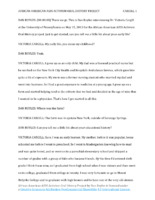
Dr. Victoria Cargill grew up on a farm outside Saratoga Springs, New York. She credits the experience of "helping tend to the critters that we had" and the influence of her parents with her decision early on to become a physician. Cargill graduated high school at 16 and attended Mount Holyoke College before going to Boston University School of Medicine and then to a residency at Harvard.
It was in Boston, in 1982, while working as a part-time doctor at Fenway Community Health Clinic, that Dr. Cargill saw her first patient with AIDS. As she moved on to a fellowship at the University of Pennsylvania and then a job at Case Western Reserve University, she would care for more and more people dying of AIDS complications. She would also see the disproportionate impact of the disease on Black communities become more and more apparent.
With that disproportionate impact in mind, Dr. Cargill started Stopping AIDS is My Missions (SAMM), a peer education program for African American teenagers in Cleveland that eventually grew to include four other cities in Ohio. Around the same time she also worked to develop HIV risk reduction peer education programs for women in public housing projects in Cleveland. She reports that, in addition to becoming educated about HIV/AIDS, the teens and women in these programs gained a sense of empowerment and agency over their lives.
Around the time that Dr. Cargill went to work at the National Institutes of Health in the late 1990s, there was mounting political pressure on federal agencies from the Congressional Black Caucus to do more to address AIDS in Black communities. Cargill describes the creation of the Minority AIDS Initiative in 1998 under President Bill Clinton, and explains the need for culturally competent HIV treatment and prevention programs. Finally, she discusses some of the challenges of HIV prevention with queer youth of color in house ball communities and among Black trans women, as well as the ways that experiences of systemic racism and poverty create challenges for treatment adherence in the patients that she continues to see.
The transcript of this interview has been edited for clarity by Dr. Cargill. When quoting from this interview, please refer to the PDF transcript.
Oral history interview with Dr. Victoria Cargill, conducted at the University of Pennsylvania on May 15, 2013 by Dan Royles for the African American AIDS Activism Oral History Project. This interview was transcribed by Keegan Shepherd thanks to generous support from the Chris Webber Memorial Fund.
-
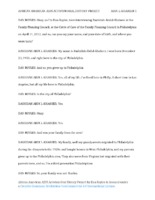
Rashidah Abdul-Khabeer (b. 1950) has spent most of her life in Philadelphia, where she grew up amidst the social change and political ferment of the 1950s and 1960s. She converted to Islam during college—having been raised in a Baptist church—and went on to become a nurse and infectious disease control specialist. In that capacity, she became aware of AIDS early on in the epidemic, and realized that the disease would take a particular toll on marginalized communities. She began to volunteer with Philadelphia AIDS groups, which were primarily oriented toward white gay men, and became frustrated with their apparent unwillingness to develop specific outreach and education efforts for African Americans. In 1985 she founded Blacks Educating Blacks About Sexual Health Issues (BEBASHI), one of the country's first black AIDS service organizations. Abdul-Khabeer (who at the time was known as Rashidah Hassan) gained national attention for her work with BEBASHI, and traveled the country attending conferences and educating others about AIDS in black communities. In 1994 she resigned as executive director of BEBASHI, and went on to work on HIV prevention projects for the Circle of Care at the Family Planning Council of Southeastern Pennsylvania. In this interview she discusses the relationship between her religious faith and her work in health and human services, her career as an AIDS activist, and current challenges in the fight against HIV/AIDS.
Today continues its mission of improving the health of economically disadvantaged Philadelphians.
This interview was conducted by Dan Royles for the African American AIDS Activism Oral History Project on April 11, 2012. This interview was indexed using the Oral History Metadata Synchronizer by Maria Santiago in June 2016, thanks to generous support from the Chris Webber Memorial Fund
-
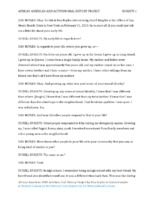
Oral history interview with Durell Knights, conducted at Gay Men's Health Crisis on February 21, 2013 by Dan Royles for the African American AIDS Activism Oral History Project.
-
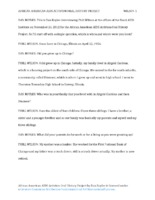
Oral history interview with Phill Wilson, conducted at the Black AIDS Institute on November 26, 2012 by Dan Royles for the African American AIDS Activism Oral History Project.
-
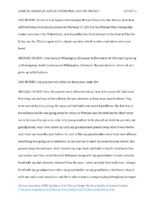
Oral history interview with Michael Hinson conducted for the African American AIDS Activism Oral History Project by Dan Royles on February 19, 2013. Mr. Hinson discusses his youth in Delaware and South Carolina, coming out as a black gay man, and his work with Blacks Educating Blacks About Sexual Health Issues (BEBASHI), Colours, the city of Philadelphia, and the Center for Black Equity.
-
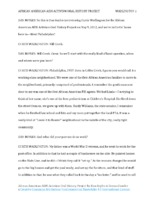
Curtis Wadlington (1957-2012) grew up in Cobbs Creek, a neighborhood in West Philadelphia, where he spent most of his life. As a teenager, Wadlington began working as a camp counselor, which marked the beginning of his career in human services. Although he had romantic and sexual relationships with men, Wadlington did not identify with Philadelphia's downtown "gayborhood," on account of the racism that he and other men of color experienced there. As AIDS began to strike gay men and people of color in the early 1980s, Wadlington and others accused Philadelphia AIDS groups, which were primarily oriented toward white gay men, of ignoring the growing epidemic in the city's African American community. Thus, Wadlington became an early member of Blacks Educating Blacks About Sexual Health Issues (BEBASHI), one of the country's first black AIDS service organizations. Today BEBASHI continues its mission of improving the health of economically disadvantaged Philadelphians.
This interview was conducted by Dan Royles for the African American AIDS Activism Oral History Project on May 9, 2012. This interview was indexed using the Oral History Metadata Synchronizer by Maria Santiago in June 2016, thanks to generous support from the Chris Webber Memorial Fund.






